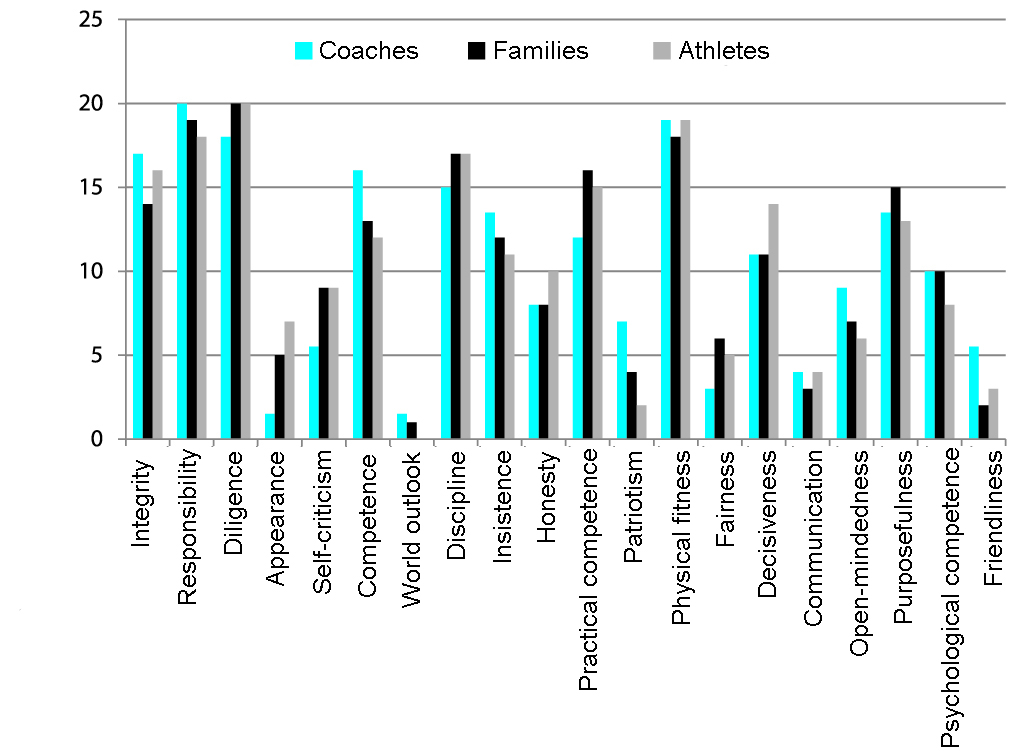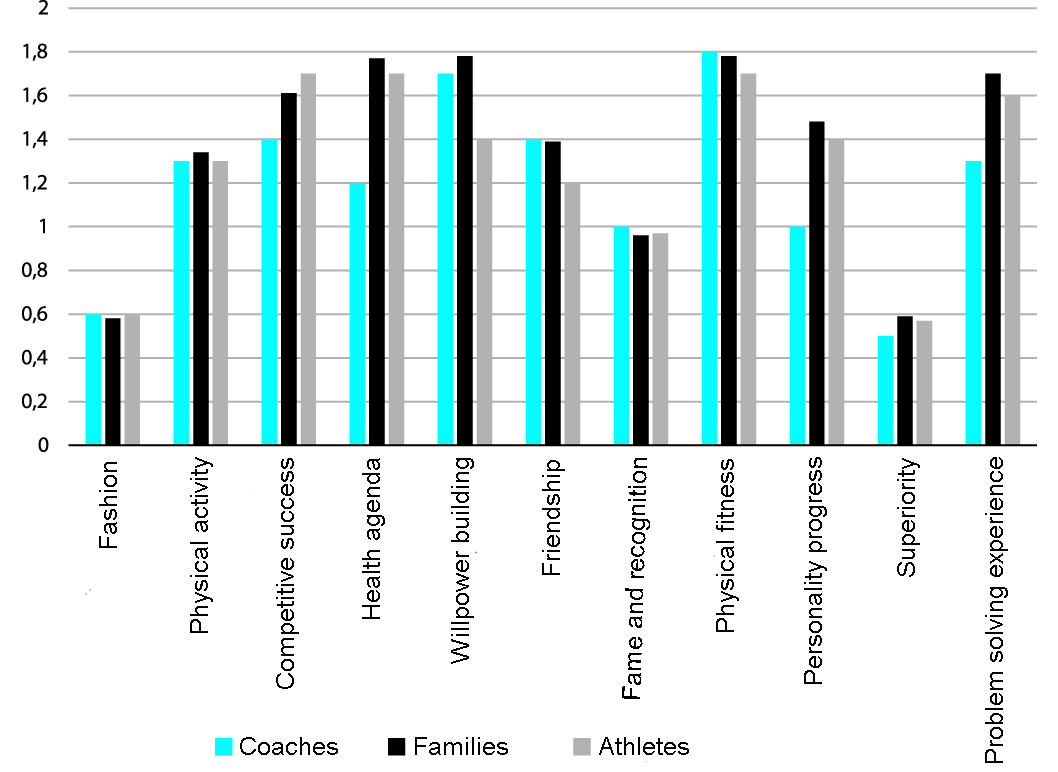Educatory resource of competitive environment at Olympic reserve school
ˑ:
Dr.Hab., Professor I.V. Manzheley1
PhD E.T. Kolunin1
Postgraduate G.A. Kutsenko1
1Tyumen State University, Tyumen
Keywords: educatory resource, sport school, competitive environment, coach-athlete-family cooperation, key personality qualities, motivations, service quality.
Background. The socio-economic imbalances with breakdown of the national educational system in the late XX century have had their negative effects on the recreational services and were detrimental in many aspects to the spiritual sphere, health service and physical development standards of the young generations. It is encouraging though that the Educational Sector Development Strategy of the Russian Federation for the period up to 2025 (approved in 2015) gives a special priority to the patriotic, physical and sporting education of children and youth. Sports, sport schools and sporting communities on the whole offer a great and still untapped educatory resource for the mental and physical health improvement and spiritual progress with their excellent behavioral models and character shaping cultures that encourage the young people for physical progress, trainings and competition viewed as a life school with its specific challenges and high popularity; conditional on a good coverage of sport events and accomplishments by the mass media organizations, perfect role models and ethical standards and, above all, the traditional system of physical education and sporting culture [1-4,6,7,9,10].
For the last decade a sport school as an institution has been increasingly viewed in the context of the special educational environment with its range of interrelated sporting and age-specific developmental missions [8], with the cultural resource of the sporting environment considered highly promising and beneficial for the advanced education service system.
Objective of the study was to analyze the educatory resource offered by a sport school.
Results and discussion. The educatory resource offered by a sport school may be referred to as the integral notion prioritizing the best sporting values, traditions and the environments-specific prerequisites and provisions for a personality development and self-development on a fully-fledged basis. It is important that every contributor to the sporting environment (coach, athlete, families, managers etc.) facilitates operations and constructive efforts of the other contributors with the relevant motivational and control aspects [5].
Sampled for the study run in Tyumen in 2017-18 were 100 physical education teachers; 70 children’s coachers (including 50 from the municipal sport schools and 20 from the CYORSS-3); 374 junior athletes from CYORSS-3; and 359 their family members. The sample was surveyed by the following questioning survey forms: Own Limitations Analysis by M. Woodcock and D. Francis; Career Anchors by A. Stein; Coach-Athlete Relationship Scale and the Coach-Family Relationship Scale by Y. Khanin and A. Stambulov.
The above surveys found the ‘data processing inability’ ranked on top of the limitations for success (95%) by the physical education teachers and coaches; ‘inefficient time management’ was ranked second by most of the physical education teachers (85%) and coaches (25%); and the ‘self-control inability’ was ranked the third by the physical education teachers and 1-4 by 60% of the coaches – that may be interpreted as indicative of the need for permanent advancement courses and self-education projects.
Furthermore, ‘stable job’ was ranked on top of the career expectations (rank 1) by 95% of the sample; followed by the ‘stable residence’ (rank 1-2) by 60% of the sample; and the ‘service and loyalty’ (30%), ‘independence’, ‘challenge’ (25%) and ‘integrated lifestyle’ (25% of the female group).
The coaches were found to be governed in their decision-making by mostly the physical progress and technical skills and qualities of their trainees. Furthermore, male group from CYORSS-3 was found to rank the technical skills and qualities on top (rank 1-2) of the list of priorities, whilst the female group gives the top priority (rank 1-2) to facilitating climate for the teamwork and volitional/ ethical qualities of trainees. Most challenging for the coaches were reportedly the tactical skills and stress tolerance formation aspects of the coaching service; and most successful were reportedly their efforts to consolidate the children’s teams.
Professional service qualities of a children’s coach most appreciated by the families, athletes and other coachers included integrity, responsibility, diligence, practical competence and discipline. It should be noted that the junior athletes tend to appreciate the coach’s appearance and fairness more than the adult groups; and the families rank highest the coach’s psychological competence: see Figure 1.

Figure 1. Coach’s professional service qualities ranked by the athletes, families and coaches, points
The best personality qualities of a successful athlete, in opinions of the coaches, families and athletes, include diligence, responsibility, physical fitness and discipline; with the athletes and families ranking diligence on top of the list in contrast to the coaches who prioritize responsibility. The athletes and families were also found to rank mental fitness higher than the coaches: see Figure 2.

Figure 2. Athlete’s personality qualities ranked by the athletes, families and coaches, points
The athlete’s key progress motivations, in opinions of the coaches, families and athletes, are dominated by physical progress, willpower building and competitive success motivations. It is important that both the families and athletes mention the ‘health agenda’ and ‘problem solving experience’ among the key motivations for the trainings and progress: see Figure 3.

Figure 3. Athlete’s sporting motivations
The questioning survey found that the junior athletes are most vulnerable in the precompetitive periods to anxiety (22%) and fears (13%) and tend to explain their failures by the poor physical, technical and/or mental fitness.
Our analysis of the coach-family-athlete relationships has found that both the athletes and families tend to underestimate the personality and operational qualities of coaches as verified by measurements on three scales (gnostic, emotional and behavioral) with the averages of 6.85 and 6.87 points, respectively. It should be mentioned that 90% and 10% of the coaches were highly and averagely rated by the trainees and their families. Families tend to rank coaches on the gnostic and emotional scales higher than the athletes, whilst the athletes prioritize the behavioral aspect i.e. their real relationship with the coach (see Figure 3) that may be due to the fact that their relationship with the coach is closer and takes more time. On the whole, the coach-family-athlete relationships were ranked fairly harmonic.

Figure 4. Coach-family-athlete relationship
Survey of the sample opinions on the training system improvement options found most of the coaches (75%) and families (57%) appreciating support from the sport celebrities, open master classes and psychological support services. Most of the families (60%) disagree with the families being barred from watching the training process, whilst 85% coaches support this measure.
Survey of the families’ satisfaction with the quality of the physical education and sport services provided by the sport schools found 84.7% of the families appreciating the coaches’ professional competency and communication skills; 76% appreciating the school management open-mindedness and friendliness; 74% recognizing the friendliness of the school service staff; and 71% happy with the school pricing policies and service accessibility. And 8% of the families wished the schools to offer more physical education and sport service options and be more efficient in the informational support.
Conclusion. Sport schools viewed as the open, dynamic and consumer-needs-sensitive educational systems operated by the school management and coaches for progress of junior athletes at satisfaction of their families – shall take persistent efforts to identify potential problems, find footholds and growth points for the reforms to improve their educatory and training services.
Since services of many children’s coaches are still limited by the ‘data processing inability’ with the career motivations dominated by the ‘job stability’, ‘residence stability’ and ‘service and loyalty’, we have developed the institutional development strategy geared to facilitate progress of the school staff by the advancement trainings to improve the service quality, with an active contribution from families for success of the psychological support service; with the constructive cooperation, personality progress and project skills cultivating trainings; due codes of conduct for the coaches, athletes and families; and special websites, social networks and self-education resources for every contributor to the sport school service.
References
- Bal'sevich V.K., Lubysheva L.I. Sportivno-orientirovannoe fizicheskoe vospitanie: obrazovatelny i sotsialny aspekty [Sports-centered physical education: educational and social aspects]. Teoriya i praktika fiz. kultury, 2003, no. 5, pp. 19-22.
- Bobylev G.P. Sportivnaya shkola kak vospitatelnaya organizatsiya [Sport school as educational organization]. PhD diss. abstract. Moscow, 2006, 17 p.
- Kolunin E.T. Konvergirovanie sredstv gimnastiki na nachalnom etape podgotovki v igrovykh vidakh sporta [Converging gymnastics techniques at initial training stage in team sports]. Teoriya i praktika fiz. kultury, 2016, no. 6, pp. 60.
- Lubysheva L.I. Sovremennaya sportivnaya nauka: ot stagnatsii k novoy paradigme razvitiya [Modern sport science: from stagnation to new development paradigm]. Teoriya i praktika fiz. kultury, 2017, no. 5, pp. 3-5.
- Manzheley I.V. Vospitatelny potentsial sportivnoy sredy vuza [Educative resource of academic sporting environments]. Teoriya i praktika fiz. kultury, 2017, no. 12, pp. 24-27.
- Panachev V.D. Sport kak sotsialny institut v razvitii lichnosti [Sport as social institution in personality development]. PhD diss.. Perm, 2000, 231 p.
- Stolyarov V.I. Teoreticheskaya kontseptsiya sporta na osnove dialekticheskoy metodologii (k diskussii o sovremennom sporte) [Theoretical concept of sport based on dialectical methodology (to discussion about modern sports)]. Fizicheskaya kultura: vospitanie, obrazovanie, trenirovka, 2016, no. 5, pp. 5-9.
- Khvatskaya E.E. Obrazovatelnaya sreda sportivnoy shkoly kak vneshniy resurs «dvoynoy» karery sportsmenov [Sport school educational environment as inner resource of athlete's double career]. Resursy konkurentosposobnosti sportsmenov: teoriya i praktika realizatsii: sb. nauch. trudov VI Vserossiyskoy nauchno-prakticheskoy konferentsii s mezhdunarodnyim uchastiem [Proc. VI Nat. res.-pract. conf. with intern. part. 'Resources of athletes' competitiveness: theory and practice of implementation']. Krasnodar, 2016, pp. 234-237.
- Khromin E.V. et al. Innovatsionnoe upravlenie kak osnova razvitiya shkolnogo, detsko-yunosheskogo i massovogo sporta na munitsipalnom urovne [Innovative management to underlie municipal development of school, youth and mass sports]. Teoriya i praktika fiz. kultury, 2015, no. 12, pp. 6-9.
- Fabrichnikov D.A. Reshenie vospitatelnykh zadach v protsesse trenirovochnoy raboty s yunyimi sportsmenami v detskikh sportivnykh shkolakh [Solution of educational tasks in training process with junior athletes in children's sport schools]. PhDdiss. abstract. Tyumen, 2005, 26 p.
Corresponding author: mangeley60@mail.ru
Abstract
The study analyzes the educatory resource of competitive environment at a Children and Youth Olympic Reserve Sport School (CYORSS) with a special emphasis on the priority goals and challenges of the coaching service; key requirements to the professional qualities of the children’s coaches; and the junior athlete’s personality qualities valuable for the coaches, families and teammates. The study explores the education process management within the coach-athlete-family cooperation system with due attention to the individual motivations of and challenges faced by the underage athletes; and offers special initiatives to improve the training process and school educational service quality. It was found that the sport school viewed as the dynamic, open and consumer-needs-sensitive educatory environment for efficient cooperation of the school administration, coaches, underage athletes and their families – shall design its education policies so as to highlight the key problems, progress opportunities and growth points to facilitate the constructive reforms and effectively mobilize resources for progress.



